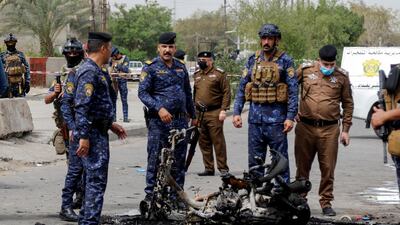Iraqi Prime Minister Mustafa Al Kadhimi ordered security forces to increase operations against militants after deadly attacks that officials blamed on ISIS.
Mr Al Kadhimi, who is also commander-in-chief of the armed forces, issued the directives at meeting convened late on Sunday after attacks on security troops in central and northern Iraq claimed at least 18 lives on Friday and Saturday.
These included “revitalising intelligence and security efforts, reactivating pre-emptive operations to confront ISIS terrorist gangs’ movements, drying up their sources and destroying their sleeper cells”, his office said.
No group has claimed responsibility for the attacks, but Iraqi officials said they were carried out by ISIS militants.
Leaders of the federal security forces, the ministers of interior, defence and finance, and leaders of the government-sanctioned paramilitaries known as the Popular Mobilisation Forces, made up mostly of Iran-backed militias, attended the meeting.
The meeting also discussed co-operation between Baghdad-run security forces and those under the control of the self-ruled Kurdish region in “disputed areas” that are claimed by both sides, and where some of the attacks took place.
The deadliest attack was in the town of Tarmiyah, about 20 kilometres north of the capital Baghdad, where a roadside bomb killed two officers and two soldiers in a military convoy.
Another officer and two more soldiers died when militants ambushed reinforcements sent to the scene, the military Joint Operations Command said.
Security sources said a tribal fighter and a civilian also died as fighting raged until the early morning.
Iraqi security forces have been battling ISIS militants for weeks in the area.
The militant group launched attacks against security troops and local tribal fighters using bombs and light weapons.
Outside the northern city of Kirkuk, militants killed six soldiers and wounded several in an attack on Kurdish Peshmerga forces in a disputed area, the president of the Kurdistan Regional Government said.
President Nechirvan Barzani blamed ISIS militants for the attack, saying they were taking advantage of “security voids in the disputed areas”.
Mr Barzani called for the Peshmerga and Iraqi Army to join forces to protect the territory.
Another officer and a soldier were killed when a bomb struck their convoy in the western desert bordering Syria, a security source said.
And in Diyala province, which borders Baghdad to the east, one soldier was killed and two wounded in two bomb attacks.
After more than three years of gruelling battles, Iraq declared ISIS defeated in late 2017 with the help of the US-led International Coalition.
But sleeper cells in the country’s mountains and deserts continued to carry out deadly attacks, often at night and in remote areas.
Iraqi security forces have killed or arrested thousands of suspected militants in operations against these cells.
A powerful Iran-backed militia suggested forcing Sunni residents out of volatile areas to secure them.
“Without any hesitation, we believe that the security situation in Tarmiyah and Mukhaissa in Diyala will not be stabilised without replicating the measures taken in Jurf Al Sakhar area,” Abu Ali Al Askari, a spokesman for Kataib Hezbollah, said on Twitter.
Jurf Al Sakhar, about 65km south of Baghdad, was one of the main strongholds for Sunni militant groups such as Al Qaeda in Iraq after the US-led invasion of 2003.
It came under the control of ISIS in June 2014 but it was driven out a few months later by security forces.
Thousands of Sunnis who fled the town have been unable to return as it is under the control of different militias, including Kataib Hezbollah. There are few government forces in the area.
Sunni politicians have repeatedly called for their community to return Jurf Al Sakhar, including at a recent meeting with Iran’s Foreign Minister, Javad Zarif.


